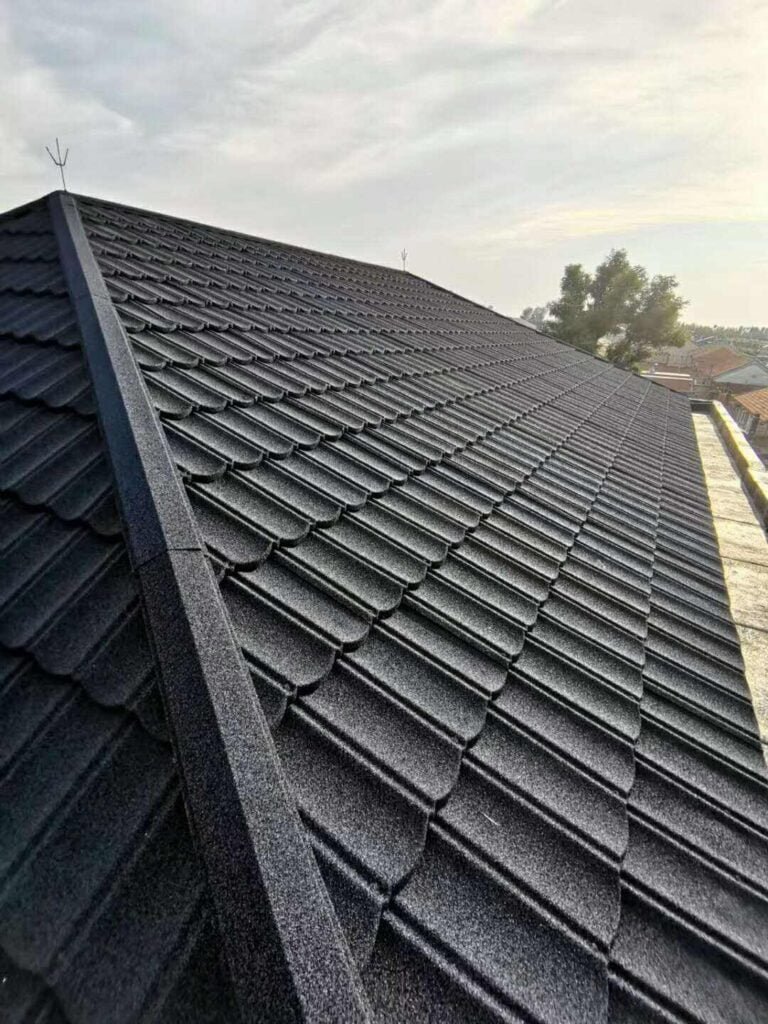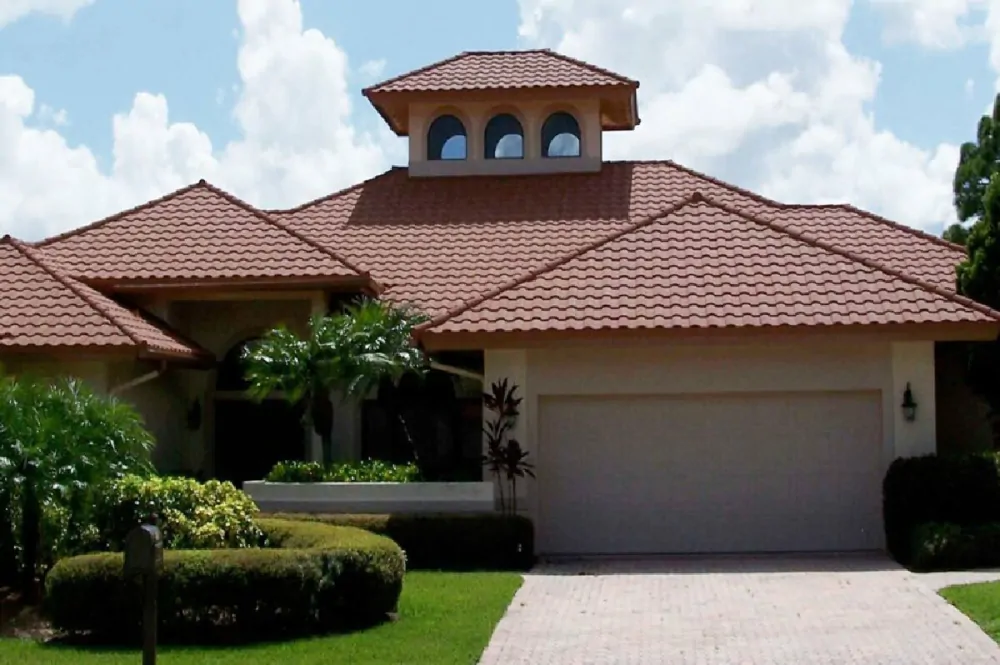在龙卷风多发地区,保护自己免受强风侵袭至关重要。作为市场上最坚固的屋顶材料之一,涂石金属屋顶是龙卷风多发地区房主的理想选择,因为它可以抵御雨、雪、冰雹和龙卷风。
在本文中,我们将介绍房主需要了解的有关抗龙卷风屋顶的知识以及石材涂层金属屋顶的优点,其中包括:
抗龙卷风屋顶应注意什么?
传统屋顶材料如何抵御龙卷风?
为什么 涂石金属屋顶 被认为是抵御龙卷风的最佳屋顶材料之一!
抗龙卷风屋顶的注意事项
龙卷风通常由强雷暴引起。除了飓风外,这些风暴还会带来冰雹、风卷碎屑和风吹雨打。因此,您需要找到一个能够抵御所有这些情况的屋顶。
冰雹和风暴碎片的影响
冰雹或暴风雨碎片(包括从家中飞出的沥青瓦)的冲击力与龙卷风的强风一样具有破坏性。一定要选择 UL2218 4 级抗冲击等级的屋顶材料。
美国保险商实验室(UL)是一家测试和认证屋顶产品的独立实验室。UL2218 冲击等级被认为是屋顶抵御冰雹或风暴碎片破坏能力的行业标准。
屋顶的抗冲击性测试方法是将一个 2 英寸的钢球从 20 英尺高的地方反复落到完全相同的地方。根据测试结果,屋顶的评级从 1 级到 4 级不等。要达到 4 级(最高级别),屋顶必须在测试过程中没有任何破损迹象。
强风
龙卷风产生的风力可与飓风媲美。因此,房主最好选择经批准可在高速飓风区(HVHZ)使用的屋顶材料。例如,由于飓风频繁登陆,迈阿密-戴德县拥有全国最严格的建筑法规。即使您的房屋不在飓风多发区,也要寻找符合 HVHZ 严格建筑规范的屋顶。
风吹雨打
风吹雨打会通过屋顶进入室内,造成漏水、发霉和其他类型的昂贵水损。选择通过 TAS-100 测试的屋顶材料。经独立的第三方实验室验证,TAS-100 每小时向屋顶喷洒相当于 8 英寸的雨水,以确认屋顶可以防止雨水渗入下层屋面板。
除了寻找能抵御风、冰雹和撞击破坏的屋顶外,许多房主还惊奇地发现,轻质屋顶对于保护房屋免受龙卷风侵袭非常重要。
就屋顶而言,并非越重越好。
剪切强度是指抵抗导致内部结构自行滑动的力的能力。例如,在钢筋混凝土梁中,钢筋的作用就是提高抗剪强度。在屋顶上,推动结构的力量通常是由飓风、龙卷风、地震和强风暴造成的。屋顶荷载过大的房屋被视为头重脚轻,很容易受到侧向力的影响。
轻质屋顶实际上有助于增强屋顶的抗剪强度,而不会在建筑物顶部堆积多余的重量,这是最不可取的。
传统屋顶材料如何抵御龙卷风
如前所述,抗龙卷风屋顶需要抵御的不仅仅是强风。然而,并不是所有的屋顶材料都能抵御冰雹、风暴碎片的冲击以及风雨。
传统的屋顶材料,如沥青瓦、粘土瓦或混凝土瓦、木瓦或木片,在某些或所有抗龙卷风屋顶类别中都存在缺陷。
即使是微弱的龙卷风,也能轻易剥落翘起或鱼嘴状的沥青瓦。EF-1 级龙卷风的风速为每小时 73-112 英里,在飓风范围内。一旦风速达到每小时 90 英里,就会超过一般沥青瓦屋顶的额定抗风能力。沥青屋顶暴露在自然环境中容易开裂和劈裂,导致紧固件周围松动。
粘土瓦、木劈瓦或木瓦片屋顶对冰雹和风暴碎屑的抗冲击保护不足。大多数屋顶根本无法保证其抗冲击性。
为什么金属屋顶更适合龙卷风?

金属屋顶的最大优点之一是能够抵御紧固件周围的开裂或劈裂。当风吹过屋顶表面时,金属板的边缘不会像沥青瓦那样卷起形成进风口。
这是因为金属屋顶不依赖钉子、订书钉或粘合剂来固定。相反,金属屋顶的设计可以抵御强风,使用高质量、耐腐蚀的螺丝紧固件和连锁技术,在强风中牢牢固定屋顶。
大多数金属屋面(如石材涂层金属屋面)都具有最高的抗风等级,这是建筑和测试屋面系统抗风性能的关键安全指标。这使得金属屋顶能够满足 HVHZ 的严格建筑规范,并通过 TAS-100 的风雨测试。
就冰雹或风暴碎片的影响而言,金属屋顶具有最高的 UL2218 冰雹影响等级。SKW 金属屋面等制造商为其屋面提供全面的终身有限质保,涵盖直径达 2.5 英寸、风速达每小时 120 英里的冰雹冲击。
金属屋顶也是市场上最轻的屋顶材料之一,有助于增强屋顶的抗剪强度。

金属屋顶:每平方英尺重达 1.6 磅。
木条/木片:每平方英尺重达 4.5 磅。
沥青带:每平方英尺重达 5 磅。
粘土或混凝土瓦:每平方英尺重达 10 磅。
金属屋顶的好处远不止抵御龙卷风。房主还可以期待金属屋顶带来的其他好处,包括
使用寿命是沥青瓦等传统屋顶材料的两到三倍。
节能高达 25%。
获得保险折扣。例如,在得克萨斯州,金属屋顶最多可为房主减少 35% 的保险费(有关可用折扣,请咨询当地保险公司)。
使房屋增值 6%。
SKW 抗龙卷风金属屋顶

SKW 金属屋面产品以其质量、耐用性和使用寿命而闻名。SKW 涂石金属屋面是在中国山东德州的工厂生产的。它经过测试并超过要求,以确保我们生产的每一块板材都具有 SKW 众所周知的质量。自 20 年前 SKW 成立以来,SKW 屋面保护房屋和建筑物免受龙卷风和自然界几乎所有其他灾害的侵袭。
准备好见证和感受 SKW 的与众不同了吗? 单击此处订购免费样品.
